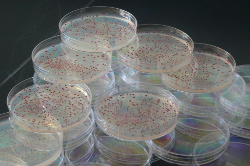 |
Image: Brian Baer |
**__Related stories:__*** linkurl:Should evolutionary theory evolve?;http://www.the-scientist.com/2010/1/1/24/1/
[January 2010]*linkurl:Darwinian time;http://www.the-scientist.com/2009/01/1/26/1/
[January 2009]
**__Related F1000 Evaluations:__***linkurl:Plasticity of animal genome architecture unmasked by rapid evolution of a pelagic tunicate;http://f1000.com/9026958?key=953n4hb8794sbf2
F. Denoeud et al., Science 330:1381-5, 2010. Evaluated by Gemma Richards and Bernie Degnan, University of Queensland.*linkurl:Evidence that adaptation in Drosophila is not limited by mutation at single sites;http://f1000.com/3836964?key=4pmy3v940vx9tr6
T. Karasov et al., PLoS Genet., 6:e1000924, 2010. Evaluated by Devin Scannell and Michael Eisen, Lawrence Berkeley National Laboratory.



















